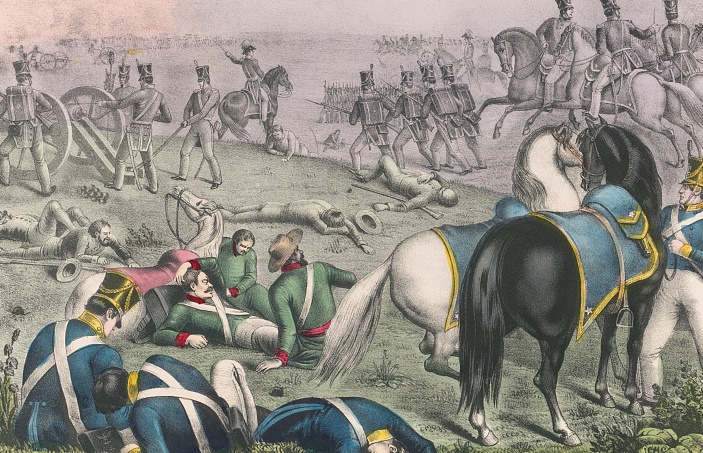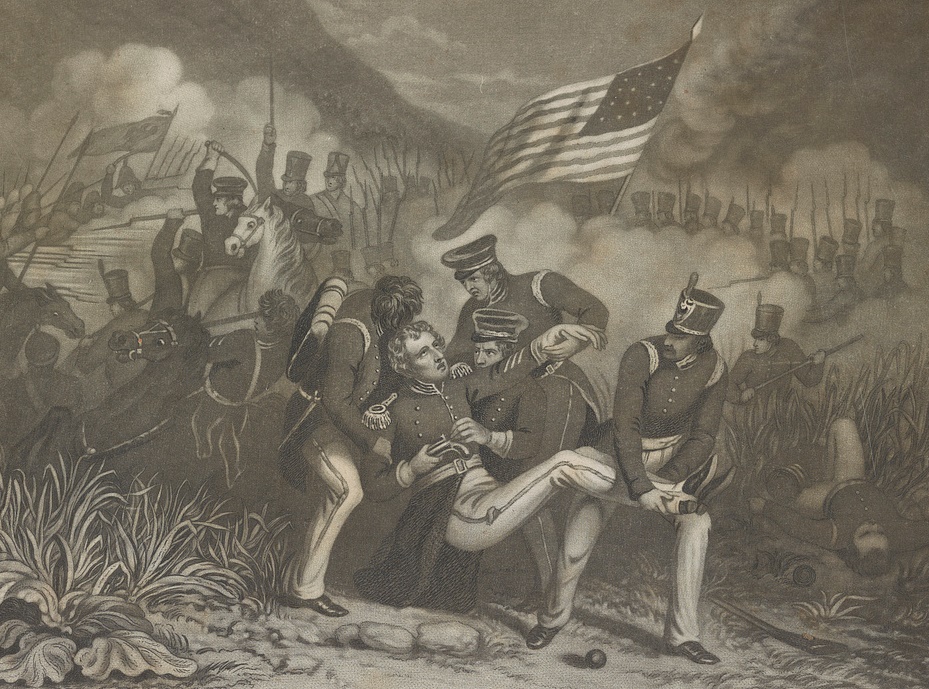Overarching Consequences of Mexico’s Defeat in 1848
From 1846-1848, the United States of America fought a war against Mexico. The conflict spanned North America, with fighting ranging from the Gulf to the Pacific, and through mountains and deserts in between. Those familiar with this period of U.S. history are generally familiar with the conflict’s major events, including Gen. Winfield Scott’s march to Mexico City, the Bear Flag Revolt, and the propelling of Zachary Taylor into political prominence. Many junior military and naval officers gained invaluable experience that shaped their thinking later during the Civil War and the United States gained control over vast swaths of territory. There is something often left missing from this discussion however, and that is how this war impacted Mexico.
When I teach the war between the U.S. and Mexico to my survey U.S. history classes, I like to end with a discussion of what this war cost Mexico. The U.S. war with Mexico is not called that in Mexico itself. Instead, many there call it the great invasion, U.S. invasion, or U.S. intervention. After the war, Mexico was plunged into continued instability, compounding the instability from before it as well, such as revolts in Texas and the Yucatan. All this ultimately resulted in the Reform War in the 1850’s (packed with regional versus national challenges as well as conservative versus liberal policies with religious undertones), the presidency of Benito Juárez, and a massive accrual of debt that in turn resulted in European interventions to demand repayment. That intervention turned into a French occupation, the deposing of Juárez, and forced installation of Austrian Archduke Ferdinand Max as Emperor Maximillian I. That in turn led to Maximillian’s overthrow and execution, along with continued instability.

My students, many of whom have families in Mexico today or whose families migrated from Latin America, love a frank discussion of the effects of both a U.S. victory and Mexican defeat, and it generally helps them see how military action can have far reaching consequences. However, I like to take things further and look at a hypothetical Mexican victory to help them truly see what was at stake. Such a Mexican victory would itself require a more stable Mexico and other factors besides a handful of battlefield victories against Scott’s army (and we are not going to dive into all that here), but nonetheless, an analysis of the aftereffects of such a victory is worth exploring.
A Mexican victory against the United States in 1848 would have global consequences, though it may not seem so on initial glance. Such a victory by Santa Anna’s military would certainly guarantee that the Mexican Cession never occurred, meaning California, New Mexico, Arizona, Colorado, and Nevada remained out of the United States. This brings the first major consequence of a Mexican victory.
Gold was discovered in California in 1848, even before the Treaty of Guadelupe Hidalgo was officially ratified and enacted. Besides this, significant silver deposits were discovered in Nevada in the 1850’s, deposits of copper and gold spanning New Mexico were also found that decade, and gold was found in Colorado’s mountains. Between 1849 and 1869, over $757 million in mineral wealth was mined from the western lands that the U.S. claimed in its war against Mexico (in addition to silver mined in Mexico itself).[1]
A Mexican victory in the war against the United States would mean that all this wealth instead would be mined and utilized by Mexico. It is quite plausible that Mexico could use this wealth to foster stability and push itself into industrialization more quickly, making it the preeminent power of North America. Meanwhile, the United States would lose access to the lands of the Mexican Cession, though it would still have access to the Pacific coast via Oregon.

This hypothetical goes even farther regarding Texas. A Mexican victory against the United States could potentially result in the U.S. returning Texas to Santa Anna’s control. If such a hypothetical transfer occurred, it would have far-reaching consequences, especially as the twentieth century began and massive oil deposits were found in the Lone Star State. A Mexican victory in the war that managed to reclaim Texas would theoretically mean said oil would thus be Mexico’s, only compounding wealth gained from the gold and silver deposits.
A Mexican victory could also have led to a more quickly destabilized United States. After all, the U.S. also faced three decades of internal arguing and civil war after the war ended in 1848. It is possible that such strife would have been exacerbated from an embarrassing loss to Mexico. In many ways, the U.S. victory in its war against Mexico was a gamechanger that solidified which nation would dominate North America for the remainder of the nineteenth century and continuing into the twentieth.
Of course this is just a cursory look at such a hypothetical, and I am certain many factors were left out of such a look at a much deeper level. Regardless, even a broad examination of such can be worthwhile. After all, it never hurts to look at things from a different perspective. The stakes could not have been higher in the war between the U.S. and Mexico, though interestingly, neither side was aware of the mineral and energy deposits they were actually fighting over.
While most Americans may think of the war against Mexico and think of California and future Civil War generals, it should not be forgotten that there were unknowns at stake and that the map and history of North America would be greatly different from a Mexican victory. Exploring the end of the U.S. war against Mexico in this way with my students helps them think deeper about the consequences of war and impacts of geography, as well as helps them explore why historical events occurred as they did, worthy lessons for anyone studying history in any capacity.
Endnotes:
[1] John H. Kemble, The Panama Route 1848-1860 (New York: Da Capo Press, 1972), 255.
I love the opportunities that contrafactual history provides. Here’s my take on a Santa Anna victory, and a United States acquiescence in it.
1) Any gold found in California, especially if discovered by an Anglo settler, either leads to another war, or to certain members of the corrupt Mexican establishment getting personally very rich. Mexico itself stays poor, feudal and faction riven.
2) The native tribes are “encouraged” to increase their warring against the isolated Mexican settlements in New Mexico, and act as a barrier to protect Texas.
3) Mexican imperialism against its southern neighbors causes its debt to balloon, inviting European intervention.
4) United States President James Buchanan goes to war with Great Britain to prevent her from seizing California and Oregon, the status of which was unresolved by President Polk’s unexpected death from Dark Horse Fever.
5) A failed Congressman names Lincoln, and a washed up Captain named Grant proclaim it “the most just war ever undertaken by one power against another.”
You win the award for best comment ever. It is both perceptive and humorous. Thank you!
This was a very interesting article. Without ability to expand slavery in Southwest, perhaps slavery would have ended without need for civil war?
Well, if we discuss alternate endings (the proverbial “What ifs”) to events like wars that changed the fortunes and possible destinies of the countries involved, it goes without saying that it is likely their histories would thus have been significantly changed. One reason Mexico was not made part of the USA was because of the slavery questions pertaining to American expansion, but obviously that wouldn’t have been an issue after such a defeat. If the War had ended in the manner this article presents, my personal belief is that “Manifest Destiny” would have ensured future conflicts with Mexico and/or European powers over Mexican territories that are now part of the contiguous USA. The effect that would have had on geopolitics would no doubt have been quite significant.
Would a different outcome to the Mexican War have resulted in a renewed interest in, say, making Canada part of the USA? Why not? Who can say what kind of ideas and political/social movements might have arose in the aftermath of such a defeat? What might have politicians and political parties of that time done in response to such events? We can never know, so the the sky really is the limit!
Neil, interesting article. I wish I could be one of your students discussing these issues. For example, Winfield Scott’s successful campaign into the Mexican interior certainly was not a foregone conclusion. Indeed, yellow fever might have decimated Scott’s army had he not been able quickly to capture Vera Cruz and promptly move inland to healthier ground. Alternate history can be fascinating.
We discuss the state of Scott’s army on its march in class as well. The army landed on the coast in March and did not capture Mexico City until September. Lots of time for things to go wrong, such as half the men being sick, as they were in reality.
Mexico really had no chance. Major political instability. Most Mexicans are illiterate and not politically motivated. The President of Mexico when the war starts doesn’t think Mexico can prevail. Mexican elites should have just settled for the Rio Grande as the border and Texas annexation.
Mexico’s navy was much weaker than their army.